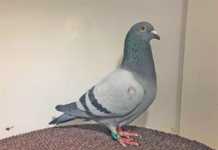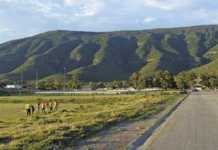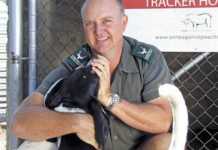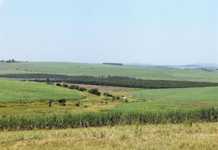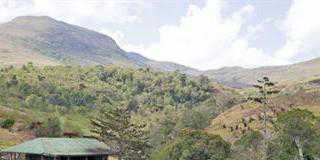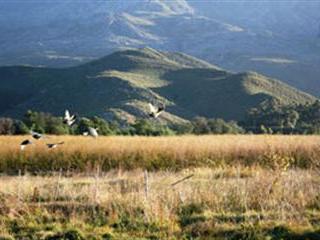
Cloud was falling over the coastal mountains beyond Barrydale. The sky was open and blue above us, but the Swartberg was under cloud, Towerkop missing. I thought it would be raining in Ladismith, but it wasn’t.
The backpackers lodge Kicks (as in “get your kicks on Route 62”, geddit?) was trying to pull off another of their music festivals, after two confirmed cock-ups in two years. I attended the first and most impressive failure, which was called the Ladismith Apricot Makietie Festival, or Rocktober, on the few wind-tattered posters I saw around Cape Town.
This third instalment had been named Wakka Wakka, and looked just as forlorn as the first, with the wind building for rain. We arrived at the farm and had tea looking out over the lavender bushes, which had put out their useless florets – acting on misinformation, T planted the field below the house with a variant that doesn’t produce the oil used commercially.
Later:
T and I went to fetch the bus from Oom Kotie’s autoshop, which is housed in a showground shed. There the bus has been sanded down and painted municipal yellow – all but a section of the roof that nobody will see. T refers to it as “our livelihood” whenever anybody asks. He hopes to take it up and down the R62, to festivals and cultural occasions, selling preserves and crafts like a latter day smous.
This is to be the age, then, in which the nagosiewa launches into popular culture, the way that Ronnie’s Sex Shop re-launched the country bar (Jurie Steyn’s voorkamer put to work in the age of internet porn). However, there doesn’t seem to be any chance the bus will succeed in the same way. Like Ronnie’s Sex Shop it too was hatched from a joke (the word ‘sex’ on the wall of Ronnie’s Shop was painted there by a friend after a night of drinking).
I can imagine T and his new friends in Ladismith cheering and laughing at the idea of the bus (which he has named the Kannabus, it being Kannaland and all; or so he says). Of course, it had to be a ford truck with a bus chassis, the old American school bus model, and sprayed banana yellow.
The same friends helped tear the seats out, fitted cupboards, installed air vents. T and I spent an entire afternoon sawing through a piece of metal that joined the cockpit shell to the framework so that a blind could be fitted over the first window. That was eight months ago. Now the thing was painted.
T had tried to pick it up earlier, but Oom Kotie wasn’t in, and the bus was nowhere to be seen. This was because the job had been completed two months later than it should have been, and T had suggested he might take as long to pay. Oom Kotie had hidden it in a nearby barn as a precaution. His assistant sheepishly told T that this was because of the rain.
That afternoon, though, the bus was where it should have been, and there was no showdown. However, when we drove out the bus snagged a big banner advertising the Wakka Wakka Festival, ripping it away from the showground entrance.
Later:
With the bus parked in its roofless lot in the farmyard, and with a swipe of creosote already on the fender from where T hit a pole on the way in, the memorial service now rushed up on us. I scratched a short ‘letter’ from the grandchildren. I practised it down in the lavender, which was alive with small daytime moths and the swallows feeding on them.
Reverend Ronald, who everyone calls Revvie Ron, arrived and set up a small altar at the back of the house. On his own initiative he had blown up and framed in gold the old man’s ID photograph. It was a remarkably serene picture for one taken so late, possibly the last picture of his face before it was altered by disease.
I remember an episode concerned with that photograph. The old man’s application for a South African ID had been returned to him because he had cut the pictures too small. This blew aside the temporary veil of self-control and amenability he had drawn over his misery after being ejected from his home and his country, and he ranted and raved in the lounge.
I remember my mother patiently cutting out new photographs and placing them with the application before re-addressing it and sealing the envelope before him.
People arrived, parked around the yellow bus, came crunching into the yard over the gravel. They all brought platters of food (butter-heavy sandwiches mainly), took prayer books from a neat stack on the garden stairs, and chose a place to sit from the mish-mash of seats we’d arranged on the green grass.
They were an elderly lot, and mostly members of the Anglican congregation ministered to by the Revvie. I remember that some of the early services had been held in the tiny clubhouse of the golf club. Now a deal had been struck with the council for use of the grand Otto Hager church at the entrance to the town, though they share space with the information centre (delimited by fold-away felt boards exhibiting sepia photographs of the 1981 Laingsburg floods).
Soon work will begin on their very own church, which will be sited on open ground opposite the de-sanctified synagogue in which T attends exercise classes. The old man’s ashes will be among the first interments (three other congregation members have died this month, including a young mother, crushed by a truck) in the planned memorial wall.
Revvie began the service by talking about the old man with a newcomer’s familiarity, saying how he had held his hand and received his wish for peace, “to go to the big kraal in the sky”, a rather unusual bit of stage-phrasing. After that T, clearly far from ready to speak about his father, who bossed him around for most of his life, broke down. He started by saying, “Most of you here only knew my father as a sick old man…” and ended with a bitter swipe at “African politics”.
My mother spoke and emphasised the old man’s love of his grandchildren, his achievements as a sportsman and farmer. She broke down afterwards with L in the spare room.
Throughout the service the big woolly Alsatian, whose nerve the land occupations in Zimbabwe had shattered, kept shuffling to the kitchen door to check on events, and the house sparrows took advantage of the congregation’s immobility to raid the feeder above my head.
SATURDAY
I rose early and went for a run through the apricot orchard, which was full of wormy fruit. I skirted the dam, turned off the Hoekoe road at the place where the upright rocks are, and joined the Towersig trail at the first beacon.
I feel, on this trail, as I once did on Bryn Farm, running beyond the yard, towards the dam through the waterberry trees, a sense of temporary membership paid for in physical effort, perhaps even a temporary sense of proprietorship, paid for with elevated emotion.
After breakfast, the Prof and I began the drive back to Cape Town so that he would be in time for a Christmas dinner for the prayer book society. Before the Plathuis turn he explained the society’s abiding mission: to have the prayers of Thomas Cramner preserved. The next hundred kilometres were devoted to a broad-ranging defence of liturgical language, explaining the style in which he reads The Passion at Christmas each year…
“‘I don’t have a problem with the language of the modern service per se but rather how it is rendered these days, so lacking in colour,” he said. “I like to read St. Peter with an Irish accent. The penitent thief on the cross is the most difficult. I try an accent, something like one of Kipling’s soldiers.
“But when it comes to the last line, because I’m not a professional actor, I tend to choke up,” he explained.
As we descended towards Barrydale he delivered the lines: “Verily I tell you… this day you will walk with me in paradise.”

